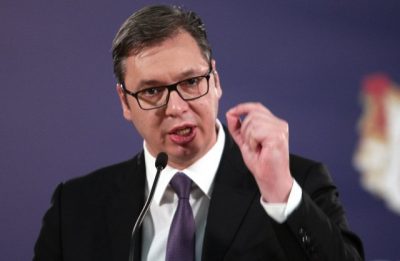Serbia President Vucic’ Failed Efforts to “Recognize” Kosovo as an Independent Nation State
The Albanians Suspiciously Confirmed Vucic’s Lost Kosovo Claim Right After He Made It

Serbian President Vucic has had a lot of difficulty getting his people to support his efforts to “recognize” the breakaway NATO-occupied Province of Kosovo as “independent”, yet just a day after he told parliament that “we need to recognize that we have been defeated” and “we lost the territory”, the region’s special forces carried out a brazen provocation in the Serb-populated northern area and suspiciously proved his point.
Continuing The Ethnic Cleansing Campaign
War drums were beating once again in the Balkans on Tuesday (or so the Mainstream and Alternative Medias wanted people to think) after the Albanian self-professed “authorities” in the breakaway NATO-occupied Serbian Province of Kosovo carried out a brazen provocation in the Serb-populated northern frontier that Russian Foreign Ministry spokeswoman Zakharova described as an “effort to intimidate and force out the non-Albanian population and forcibly establish control over the area”.
Deutsche Welle, screenshot, December 30, 2018
Heavily armed special forces arrested over a dozen Serbs on the pretext that they were supposedly involved in “organized crime” and even briefly detained a Russian national working for the UN Mission in Kosovo before releasing him, with the entire event showing that the “authorities” there are capable of acting with impunity despite officially being barred from carrying out those types of raids in that part of the region. Belgrade naturally condemned the incident and even dramatically put its troops on combat alert, though few believed that this stunt was sincere and that a liberation campaign was imminent, especially after what President Vucic told parliament just the day before.
Did Vucic Blow A Dog Whistle?
The Serbian leader is known for his extreme Europhilia and willingness to do whatever is necessary in order for his country to join the EU, which requires “normalizing” ties with Kosovo on the de-facto level of state-to-state relations that his critics fear would then eventually become de-jure with time. He’s faced vehement resistance to his efforts to comply with Brussels’ demands, which is why he boldly told elected officials the following on Monday:
“We need to recognize that we have been defeated…We lost the territory. I did not opt to continue with lies and deceit. I have told everyone: There is no Serbian (visible) authority in Kosovo except in hospitals and schools…We have two options – to normalize relations by reaching an agreement or to maintain a frozen conflict…We will ask people to say what they think about a possible compromise solution in a referendum.”
Right on time as if to confirm his claim about how Kosovo is lost, the Albanians carried out their provocation less than 24 hours afterwards, which seems to have been preplanned given its scale and audacity but nevertheless might have been pushed forward after Vucic’s (deliberate or unintentional) dog whistle, thus raising suspicions about what’s really going on. It can’t be proven that he coordinated this with Pristina, but that still won’t stop some people in the opposition from speculating that he did.
The “New Balkans”
Regardless of whether it was just a coincidence that the Albanians ordered their raid when they did or if there might be something more to the story that initially meets the eye, the bigger picture is that the Balkans are on the brink of yet another “Balkanization” after former British diplomat Timothy Less’ plan to partition the region along ethno-religious lines is gaining traction among all Great Powers, Russia included. That’s not to say that Russia necessarily thinks that this is the best solution, but just that it’s pretty much powerless to alter the course of events and might therefore have resigned itself to “going with the flow” in the hopes of guiding this process in the direction of its interests as much as is realistically possible, as explained in the author’s earlier piece this year about how “Russia’s Recognition Of ‘North Macedonia’ Is Part Of The ‘New Balkans’ Plan“. The Albanians are obviously eager to accelerate this process, but acting as aggressively as they did on Tuesday might actually make it more domestically difficult for Vucic to go along with their plan.
*
Note to readers: please click the share buttons above or below. Forward this article to your email lists. Crosspost on your blog site, internet forums. etc.
This article was originally published on Eurasia Future.
Andrew Korybko is an American Moscow-based political analyst specializing in the relationship between the US strategy in Afro-Eurasia, China’s One Belt One Road global vision of New Silk Road connectivity, and Hybrid Warfare. He is a frequent contributor to Global Research.


